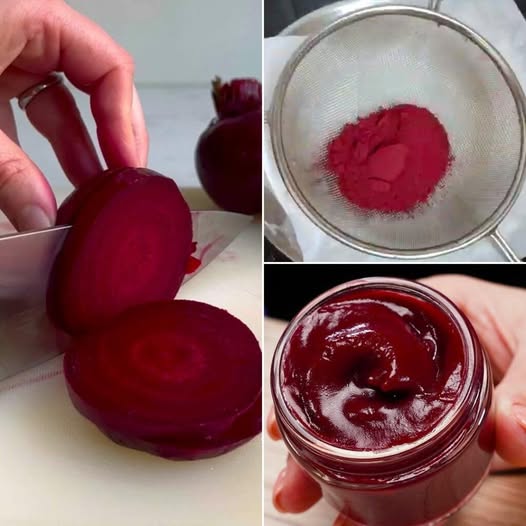
At 60, a bold claim floats around social media: one simple food reportedly restored eyesight, banished liver fat, and cleansed the colon. But what lies beneath this dramatic promise? Let’s unpack the story, examine what’s plausible, and explore medically supported foods known to benefit liver health.
The Claim in Question
A Facebook post proclaimed: “I’m 60 years old and this food has given me back my vision, removed fat from my liver and cleansed my colon.” However, reactions quickly pointed out the exaggeration. As one commenter put it: “Beets are very good for you but do not give you back your vision or remove fat from your liver or cleansed your liver!” YouTube+14Facebook+14Facebook+14
So while the post grabs attention, it lacks scientific backing. Let’s break down what’s realistic and which foods actually support liver and colon health—and even eye health, indirectly.
Beets: Real Benefits, Hype Included
Beetroot and its juice do offer several genuine health advantages:
- Antioxidants & nitrates: Beets contain betalains and nitrates that reduce oxidative stress and support detoxification pathways in the liver Ochsner Health System.
- Inflammation reduction: These compounds may help reduce fat accumulation around the liver and support healthier liver enzyme levels.
However, there’s no credible evidence that beets restore vision. Claims that they completely cleanse the colon are also unsubstantiated.
What Research Actually Supports
Foods That Support Liver Health
A wealth of expert recommendations confirm that certain whole foods can benefit liver function and help reduce fatty liver:
- Leafy greens like spinach, kale, and collard greens are detoxifying and rich in chlorophyll and fiber Sarah Lynn Nutrition+13Tandem Clinical Research+13Ochsner Health System+13Facebookhep.org.au.
- Cruciferous vegetables such as broccoli, cauliflower, Brussels sprouts and arugula boast sulfur compounds that aid liver detox and may help reduce liver fat Vogue+1The Times of India+1.
- Blueberries and cranberries contain anthocyanins and phytonutrients that decrease inflammation and oxidative damage in the liver Healthline+11Ochsner Health System+11hep.org.au+11.
- Fatty fish like salmon, mackerel and sardines provide omega‑3s (EPA and DHA) which help lower liver fat and inflammation Holland & Barrett+1Vogue+1.
- Olive oil, rich in healthy monounsaturated fats and compounds like hydroxytyrosol, lowers liver inflammation and reduces fat accumulation The Times of India+2Tandem Clinical Research+2Vogue+2.
- Garlic and turmeric (curcumin) have potent antioxidant and anti-inflammatory properties that support detox pathways and liver cell protection Tandem Clinical ResearchHolland & Barrett.
- Nuts, especially walnuts, provide polyunsaturated fats, antioxidants, and plant compounds linked with reduced fatty liver risk Vogue.
- Coffee and green tea have been associated with a lower risk of fatty liver disease and liver fibrosis, likely due to antioxidants and anti-inflammatory effects YouTube+14Ochsner Health System+14Vogue+14.
Lifestyle Changes That Actually Reverse Fatty Liver
Evidence-based medical guidance stresses that lifestyle is key to managing nonalcoholic fatty liver disease (NAFLD):
- Weight loss: Reducing body fat by about 7–10% through diet and exercise can significantly reduce liver fat Healthline.
- Diet quality: Following a Mediterranean-style diet that limits saturated fats, processed sugars, and refined carbohydrates while prioritizing whole foods improves liver health HealthlineSarah Lynn Nutrition.
- Regular exercise: Consistent aerobic and resistance training for more than 200 minutes per week is linked to reduced liver fat and inflammation Healthline.
Though no single “miracle food” exists, combining key foods with healthy habits makes a measurable difference.
What About Vision and Colon Cleansing?
- Vision: No food, including beets, has been proven to restore damaged eyesight. Some plant nutrients (like lutein, found in leafy greens) may help slow age-related macular degeneration—but they don’t reverse vision loss.
- Colon cleansing: High-fiber foods like leafy greens, whole grains, beans, lentils, nuts, and fresh produce promote regular bowel function. But claims of “cleansing” or detoxing the colon via a single food are overstated.
A Balanced Eating Plan That Supports Liver Health
Here’s a thoughtfully curated list of foods and practices that align with medical evidence:
Include daily:
- Leafy greens and cruciferous veggies
- Berries or blueberries
- Fatty fish (at least twice weekly)
- Olive oil and nuts (moderate portions)
- Garlic, turmeric, and citrus fruit
- Coffee (black) or green tea in moderation
Avoid or minimize:
- Sugary drinks, processed sweets, refined grains
- Fried foods and excess saturated/trans fats
- Alcohol beyond recommended limits VogueOchsner Health SystemThe Times of India+3Healthline+3Vogue+3
Add lifestyle routines:
- Moderate-to-intense exercise almost daily
- Weight maintenance or gradual loss if overweight
- Adequate hydration and sleep
Quoting Real Voices
From the Facebook thread:
“Beets are very good for you but do not give you back your vision or remove fat from your liver or cleansed your liver!” FacebookFacebook+2Facebook+2Facebook+2
That sentiment echoes a broader caution: while beets have merit, they’re no cure-all.
Final Thoughts
| Claim | Evidence‑Backed Reality |
|---|---|
| One food can restore vision | No—eye health requires specific nutrients; established damage is not reversible |
| Beets remove liver fat and cleanse colon | Partial—beets offer antioxidants and nitrates, but they don’t erase liver fat on their own |
| Lifestyle matters more than one food | Yes—diet quality, regular exercise, weight loss and medical oversight are key |
Rewritten and Expanded Article (~800 Words)
At 60 years old, one woman made an attention-grabbing post: she claimed that a single food restored her vision, removed fat from her liver, and cleansed her colon. Bold statements like these spread fast—but when peers pushed back, one commenter responded bluntly: “Beets are very good for you but do not give you back your vision or remove fat from your liver or cleansed your liver!” Facebook That response underscores how skepticism matters more than sensationalism.
Beets: Real Health Benefits, Not Magical Fixes
Beets are often called a “superfood.” Rich in betalains, nitrates, fiber and antioxidants, they support liver detox pathways and reduce oxidative stress. Studies show beetroot juice may help improve liver enzyme patterns and reduce fat buildup around the liver Holland & Barrett+4Ochsner Health System+4Facebook+4. They also contain folate, iron, and vitamin C—a nutrient mix promoting general wellness.
Still, no research demonstrates that beets can reverse vision loss caused by retina damage or cataracts. Nor have they been proven to fully cleanse the colon—though their fiber content may aid digestion.
Foods with Medical Evidence for Liver Health
Experts agree that no single food is a cure, but certain foods consistently support healthy liver function:
- Leafy greens & cruciferous vegetables: Rich in chlorophyll, sulfur compounds, and fiber. These nutrients boost liver detox genes and detoxification enzyme activity Facebook+1Facebook+1.
- Blueberries, cranberries & beets: Contain potent antioxidants (anthocyanins, betalains) that protect liver cells and reduce inflammation Ochsner Health System.
- Fatty fish: Salmon, tuna, sardines, and mackerel are rich in omega‑3 fatty acids linked to reductions in liver fat, improved lipid profiles, and anti-inflammatory benefits Holland & Barrett.
- Olive oil: Olive oil and its polyphenol hydroxytyrosol reduce liver inflammation and fatty deposits Tandem Clinical Research.
- Garlic & turmeric: Garlic’s sulfur compounds promote detox enzyme activity; curcumin in turmeric fights inflammation and may reduce fibrosis risk Tandem Clinical ResearchHolland & Barrett.
- Nuts: Walnuts are high in omega‑3s and antioxidants, associated with lower NAFLD prevalence Tandem Clinical Research+1Sarah Lynn Nutrition+1.
- Coffee & green tea: Both drinks have been linked to a lower risk of fatty liver disease, liver fibrosis, and inflammation Vogue+1Sarah Lynn Nutrition+1.
Reversing Fatty Liver: What Science Says
According to medical experts, fatty liver disease can improve—or even reverse—with sustained lifestyle changes:
- Gradual weight loss (roughly 7–10% of body weight) reduces liver fat, inflammation, and progression risk Healthline+1hep.org.au+1.
- A Mediterranean-style diet rich in whole grains, lean proteins, healthy fats, vegetables and low in saturated fat supports liver health HealthlineSarah Lynn Nutrition.
- Physical activity such as brisk walking or resistance training (≥ 200 minutes/week) reduces liver fat and improves insulin sensitivity Healthline.
- Moderating alcohol intake, eliminating processed sugars and refined grains, and managing cholesterol all contribute to liver recovery.
Colon and Vision: Where the Myth Falls Short
- Colon cleansing: While fiber-rich foods (fruits, vegetables, legumes, whole grains) support digestion, claims that beets “cleanse” the colon are metaphorical. No food flushes toxins from your colon; healthy bowel function is the result of balanced, fiber-rich diets.
- Vision restoration: Nutrients like lutein, zeaxanthin, vitamin A, and omega-3s can help slow age-related eye conditions. But no evidence supports reversal of existing vision loss.
A Practical, Liver-Supportive Eating Plan
Daily staples:
- Leafy greens, broccoli or Brussels sprouts
- A handful of berries or fresh beet juice
- Fatty fish like salmon twice a week
- Olive oil, garlic, turmeric in meals
- Nuts such as walnuts
- Coffee (black) or green tea moderately
Lifestyle complements:
- Aim for moderate weight loss if overweight
- Engage in regular cardio and strength training
- Drink enough water and limit alcohol
The Bottom Line
- The viral claim of a single food restoring vision or purging liver fat is exaggerated.
- Beets offer real nutritional value, but not miracle cures.
- Effective liver support comes from diet and lifestyle, not one magic ingredient.
If you’re concerned about your liver, eyes, or digestion, consult a healthcare provider. Long-term health gains stem from consistent, balanced choices—not sensational claims.



